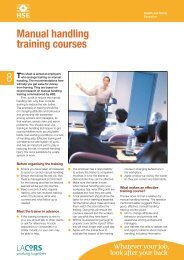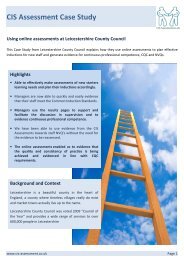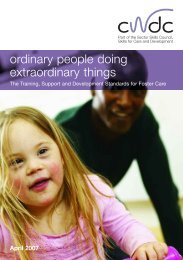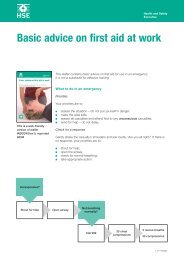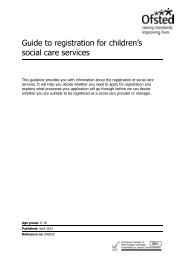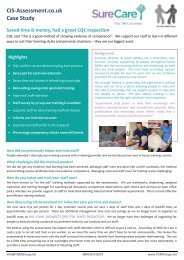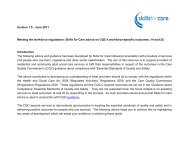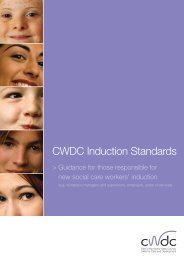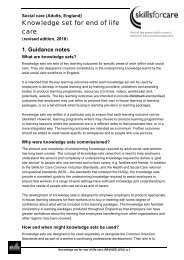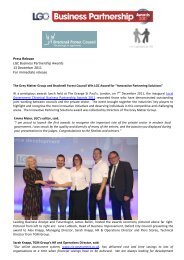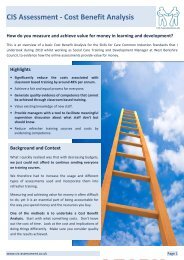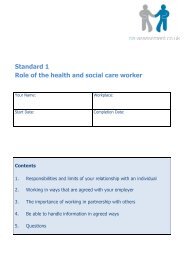Standard 8 Health and safety in an adult social care setting
Standard 8 Health and safety in an adult social care setting
Standard 8 Health and safety in an adult social care setting
Create successful ePaper yourself
Turn your PDF publications into a flip-book with our unique Google optimized e-Paper software.
4. Respond<strong>in</strong>g to accidents <strong><strong>an</strong>d</strong> sudden illness<br />
CIS Assessment Induction Workbook – Eight<br />
4.1 Be aware of different types of accidents <strong><strong>an</strong>d</strong> sudden illness that may occur <strong>in</strong><br />
the course of your work<br />
Musculoskeletal disorders <strong><strong>an</strong>d</strong> work related stress are the biggest causes of sickness absence<br />
for <strong>social</strong> <strong>care</strong> workers. It is therefore essential that you follow the correct mov<strong>in</strong>g <strong><strong>an</strong>d</strong> lift<strong>in</strong>g<br />
procedures to avoid back <strong>in</strong>jury <strong><strong>an</strong>d</strong> that you seek support if you feel stressed or<br />
overwhelmed by your work.<br />
Musculoskeletal disorders - The mov<strong>in</strong>g <strong><strong>an</strong>d</strong> h<strong><strong>an</strong>d</strong>l<strong>in</strong>g of <strong>in</strong>dividuals while car<strong>in</strong>g for them<br />
is a major cause of these <strong>in</strong>juries. Stresses <strong><strong>an</strong>d</strong> stra<strong>in</strong>s aris<strong>in</strong>g from adopt<strong>in</strong>g awkward or<br />
static postures when work<strong>in</strong>g with <strong>in</strong>dividuals c<strong>an</strong> give rise to back problems.<br />
Work related stress - When work dem<strong><strong>an</strong>d</strong>s exceed the person’s capacity <strong><strong>an</strong>d</strong> capability to<br />
cope. It is a signific<strong>an</strong>t cause of illness <strong><strong>an</strong>d</strong> disease <strong><strong>an</strong>d</strong> high levels of sickness<br />
absence.<br />
Slips <strong><strong>an</strong>d</strong> trips – These c<strong>an</strong> be for m<strong>an</strong>y reasons, for example, unsuitable or<br />
badly ma<strong>in</strong>ta<strong>in</strong>ed floor<strong>in</strong>g, wet floors, unsuitable footwear <strong><strong>an</strong>d</strong> obstacles.<br />
Sudden illness – There are m<strong>an</strong>y reasons why people fall ill. These examples could apply<br />
to <strong>in</strong>dividuals you support, yourself <strong><strong>an</strong>d</strong> your colleagues: burns, fa<strong>in</strong>t<strong>in</strong>g, bleed<strong>in</strong>g, shock,<br />
chok<strong>in</strong>g, fractures, poison<strong>in</strong>g, shock, stroke or heart attack.<br />
Ask your supervisor or m<strong>an</strong>ager<br />
what types of accident <strong><strong>an</strong>d</strong> illness are most common<br />
<strong>in</strong> your work<strong>in</strong>g environment <strong><strong>an</strong>d</strong> make sure you<br />
know how to respond to these<br />
4.2 Underst<strong><strong>an</strong>d</strong> the procedures to be followed if <strong>an</strong> accident or sudden illness<br />
should occur <strong>in</strong> your work sett<strong>in</strong>g / situation<br />
If you are present or come across <strong>an</strong> emergency situation follow these steps:<br />
A – Assess situation<br />
M – Make area safe<br />
E – Emergency aid<br />
G – Get help<br />
A - Aftermath<br />
Page 13 of 46



